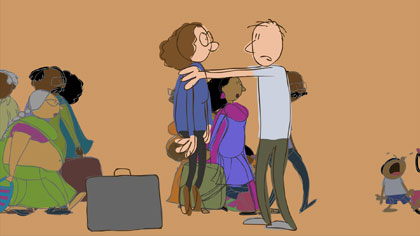Struck down with overwhelming shame She shrank within her trembling frame. Each word of Ráma's like a dart Had pierced the lady to the heart; And from her sweet eyes unrestrained The torrent of her sorrows, rained. Her weeping eyes at length she dried,
Rama's hard words on his real reasons on why he save Sita and his feelings about her broke her heart. With this details about what Sita feels and how she is reacting, the reader is able to create an image of the character int heir mind.
CC BY-NC-ND
 To me the real hero of the story is not Gilgamesh but Inkidu. Gilgamesh full of human vices despite being a demigod. But Inkidu was the reason why Gilgamesh started to live. Gilgamesh would have being nothing without his partner, he would not have suffer in like without Inkidu's death, and would have not turn his life around either. This is why Inkidu is the hero.
CC BY-NC-ND
To me the real hero of the story is not Gilgamesh but Inkidu. Gilgamesh full of human vices despite being a demigod. But Inkidu was the reason why Gilgamesh started to live. Gilgamesh would have being nothing without his partner, he would not have suffer in like without Inkidu's death, and would have not turn his life around either. This is why Inkidu is the hero.
CC BY-NC-ND  At the end of the day, the only hero in the story was Nina herself. Rama was a complete self absorbed jerk and Sita was completely submissive and did not think of her even once. While Nina went through modern similar faces of rejection and self worth, she came to terms with herself, and accepted the fact that her ex boyfriend was not worth her pain and that she had to move on in life.
CC BY-NC-ND
At the end of the day, the only hero in the story was Nina herself. Rama was a complete self absorbed jerk and Sita was completely submissive and did not think of her even once. While Nina went through modern similar faces of rejection and self worth, she came to terms with herself, and accepted the fact that her ex boyfriend was not worth her pain and that she had to move on in life.
CC BY-NC-ND